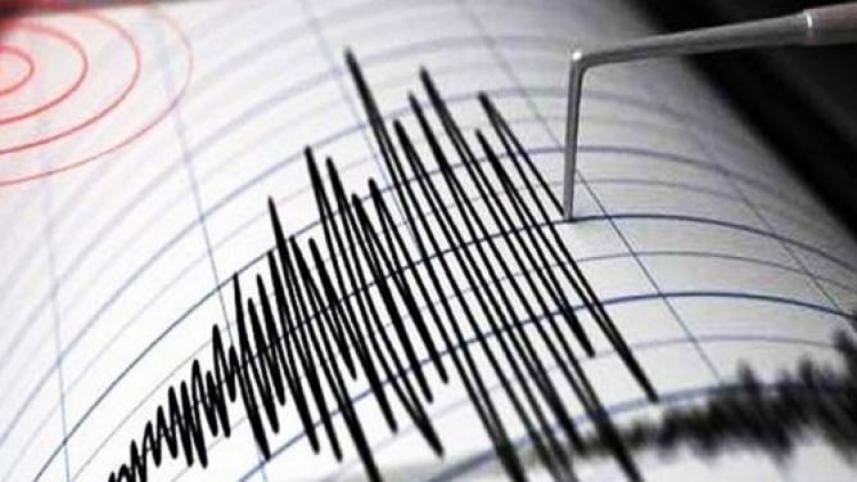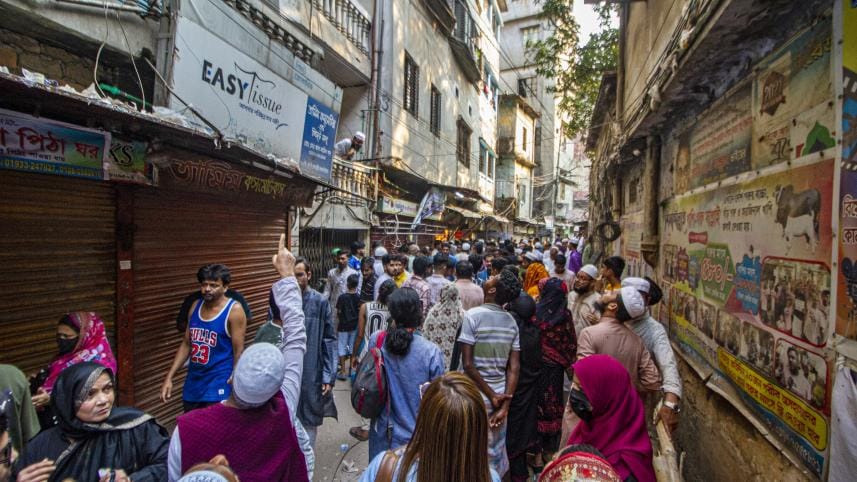Feeling panic after Dhaka’s earthquake? Expert tips to cope and stay safe

In the aftermath of the recent earthquakes, many people across Dhaka are anxious, sleepless, and unsure what to do next. Panic has quietly settled into their life and daily routines, as evidenced by late-night scrolling, sudden dizziness, or leaving the city in panic. To break down how we can actually keep our composure during these challenging times, Dr Helal Uddin Ahmed, a professor of Child, Adolescent & Family Psychiatry at Faridpur Medical College, shared his insights in an interview with The Daily Star.
Do not move from your usual routine
Many people abandon their sense of normalcy after tremors this severe, due to a phenomenon called 'earthquake anxiety.' Even as we speak, many are complaining on social media and forums about being unable to sleep, concentrate on daily tasks, or control their news and social media consumption.
Referring to this issue, Dr Ahmed noted, "Many of the symptoms people are experiencing right now, like difficulty in sleeping, dizziness, palpitations, etc., are normal reactions. None of these are weaknesses."
To tackle this mental response to uncertainty, Dr Ahmed advised everyone to hold onto their usual daily routine.

You could be doing so by making your bed, sleeping and eating in a timely manner, or playing badminton with your little ones. If possible, go to work or class or engage in other leisurely activity you normally do with your family or friends. Do not lose your sleep by scrolling on social media in the guise of "earthquake research." It does nothing except heighten your stress.
What actually worsens anxiety is deviating from your routine too drastically. Continue the usual leisure activities you enjoy — music, reading, whatever keeps you calm.
Focus on one thing at a time
Even in the middle of all this, many people still are required to go to their work or class, something Dr Ahmed actually encourages. However, the common complaint, especially among students, is that they are simply finding it difficult to focus on anything at the moment.
Dr Ahmed shared in this regard, "Inability to focus right now is completely normal. This is the brain reacting to the stress."
Given the circumstances, Dr Ahmed advised, "Just don't chase too many tasks at once. Keep your concentration to a minimum and stick to small and manageable tasks for now."
This way, you can cut yourself some slack and keep your priorities to a minimum.

Spend time with family, friends, and colleagues
Most people just need a real conversation with the people they trust and love. It could be said that you need it now more than ever. Being around others naturally reduces panic and prevents your mind from spiralling. Some people find comfort in writing how they feel in a diary.
Dr Ahmed highly recommended, "Spend time with the people around you like family, friends, co-workers, classmates. Share your concerns with them."
However, Dr Ahmed cautioned, saying, "Refrain from sharing or spreading misinformation whether in person or on your socials."
Spreading unverified claims or fear-inducing content only worsens the collective anxiety among people.
Take pre-emptive actions, but let go of things you cannot control
When it comes to earthquake preparedness, ask yourself: what would a highly effective person do? A highly effective person would focus on the things within their control and let go of the rest. Now, what is in your control?
According to Dr Ahmed, "These natural disasters are not in your control, but you can control how you respond to them."
Demystifying the cause of fear and panic among people, he also remarked, "Fear comes from the unknown. We fear darkness, but we are not scared of light because we know it."
To take action upon that fear, he suggested a simple pre-emptive framework, which the experts call the 3L method: Look, Listen, Learn.
He continued, "Look at your surroundings, listen to what experts say, and learn how to respond in those first few seconds."
Emphasising the importance of reflex, he said, "Earthquakes don't give much warning, so our reflexes matter more than our panic."
Keep an emergency kit ready with water, non-perishable food, a flashlight, first aid supplies, and copies of important documents, and make sure everyone in your household knows the safest spots to take cover and where to meet if separated.
Don't just chase after information — find ways to use it
We often overconsume earthquake updates and notifications: magnitude, epicentre, and timestamps, as if knowing these will somehow make us safer. Dr Ahmed, however, debunked that idea, saying, "To overcome any situation, we need knowledge, not information alone. Information and knowledge are not the same. We know a lot of information, but rarely know how to use it."
He pointed out this gap, citing an example, "Despite knowing better, many students jumped off their dorm buildings at the University of Dhaka in panic during the earthquake. This proves that information alone is useless unless you have processed what it actually means."
"Likewise, reading news updates such as "two earthquakes yesterday, magnitude 3, in Narsingdi and Badda" will not be of much help if you don't know how to act in the moment."
"Whatever you read or consume, make sure it becomes knowledge you can use," he emphasised.
Only then can you make the right call during emergencies: stay under a bed or table, brace beside a firm pillar, or move to an open field — the basic guidelines experts always stress.
In essence, it's time we make a cultural shift in how we deal with this as a society. Learning from how people in earthquake-prone countries like Japan or Chile live with earthquakes without losing sleep, because they have built systems and habits that make responding to panic their second nature.
Photos used in illustration (Collected / ands Mahardika, Jose Antonio Gallego Vázquez, Sarah Crego, Shefali Lincoln / Unsplash)



 For all latest news, follow The Daily Star's Google News channel.
For all latest news, follow The Daily Star's Google News channel.
Comments